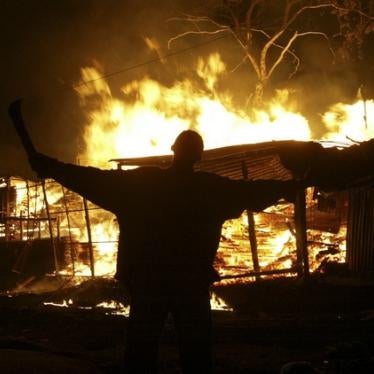There are just a few weeks to go before the December 15 deadline for the government to implement the Waki Commission's recommendation for a Special Tribunal to investigate the perpetrators of post-election violence. The good news is that the leaders of both main parties in the coalition government appear to recognize that they have no alternative but to set up the tribunal. The bad news is that the campaign to undermine its work has already begun.
Kenya has a sorry history of entrenching impunity and failing to investigate and prosecute criminal behaviour by senior politicians. The brilliance of the Waki report was in the specificity of its recommendations, the detailed timeline for implementation and provision for communicating the names of those suspected of masterminding the violence to the International Criminal Court should Kenya's leaders fail in their duty to deliver justice.
While initially wavering in their response to the Waki Commission's recommendations, both the President and the Prime Minister appear to now understand that Kenyan citizens deserve, and Kenya's foreign friends will not put up with anything less than, the full implementation of the Waki report.
We hope that in the coming days Kenya can applaud as the government publicly commits to implement Justice Waki's important recommendations: the creation of a Special Tribunal and much-needed reforms of the police, among others. However, Kenyans must be vigilant in monitoring what their politicians say. Kenya's leaders are under a lot of pressure to implement the report, but they are also under a lot of pressure to undermine the work of any tribunal.
Justice Waki described exactly the kind of tough steps that are needed if a Kenyan tribunal is to properly do its job and deliver justice: it must be rooted in the constitution and have a balance of international and Kenyan judges if it is to be independent of the High Court, the government, the Attorney General and the justice system that has in recent years served Kenya so poorly.
Leaders may try and argue that grounding the Special Tribunal in the constitution is impossible because a two-thirds parliamentary majority to amend the constitution is unachievable. They may try and argue that two international judges are too much and only one is really necessary. They may try and argue that the Truth Justice and Reconciliation Commission (TJRC) can do it all. Such arguments should be rejected.
Justice Waki is a judge of Kenya's Court of Appeal; his recommendations are based on his knowledge of the Kenyan constitution and legal system. He called for the Special Tribunal to be rooted in the constitution because he knew that was the only way to insulate it from political interference and make it truly independent. Given that the tribunal will examine important matters and - probably - powerful figures, such independence goes to the heart of the matter. If Justice Waki thought the Kenyan courts were capable of trying these cases he would not have recommended amending the constitution. The Attorney General's office has played a key role in entrenching impunity in Kenya; it has become hopelessly politicized To be effective in bringing justice and to be credible, the tribunal must remain free of any government control.
Amending the constitution is not an insurmountable hurdle. It was amended earlier this year to allow genuine power sharing, it can be amended again; and the leaders of both ODM and PNU must play their part to garner the necessary parliamentary support.
Justice Waki also recommended that the tribunal be a hybrid structure with international participation intended to ensure a balance so that the tribunal is independent and not subject to political interference, and that judges are not vulnerable to intimidation.
The TJRC was proposed under the National Accord to deal with historical grievances. It already has more than enough work to do, without considering post-election violence cases. The Special Tribunal was properly conceived as separate from the TJRC, specifically to deal with the unique challenge of investigating and prosecuting public servants without political interference.
When politicians or so-called ‘experts' at whatever level start to question the wisdom of Justice Waki's recommendations, Kenyans must question the agenda of those making such claims. The fact is that without full implementation of Justice Waki's recommendations, Kenya's institutions are unlikely to be up to the challenge of delivering justice for post-election violence. Because Kenya is a party to the International Criminal Court, the Court does not need an invitation to open investigations in Kenya, and will ultimately make its own decision as to whether the crimes committed during post-election violence fall within its jurisdiction. It acts only where national courts are unable or unwilling to do so. The message that Kenyans should send their leaders is that they will accept nothing less than 100% Waki.
As they deal with the difficult job of selling the Waki report to their supporters, some of whom are justifiably nervous, Odinga and Kibaki should reassure them that in Kenya suspects remain innocent until proven guilty, and that everyone will be able to defend themselves in a fair hearing. But they should also be clear that the work of healing and reforming the nation is not easy. In order for Kenya to have a peaceful future it must come to terms with its past.
Ben Rawlence and Nick Daniels work for Human Rights Watch







